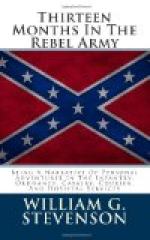I listened very intently to this advice, given as coolly as if he had been chatting about an every-day concern, and concluded that all depended upon my coolness and steadiness of nerve when the final struggle came, and resolved to sell my life dearly if it must be sacrificed to the fury of a causeless persecution. To my proposition to escape then, having a fleet horse, he would not assent, as he had pledged his honor to take me to the Vigilance Committee. Honor is as essential among lynchers as among thieves, and all I could do was to brace myself for the encounter, of the nature of which I had but an imperfect conception. About 12 o’clock we reached the place, and I was ushered into the presence of fifty or sixty as graceless scoundrels as even Arkansas can present, who greeted me with hisses, groans, and cries of, “Hang him!” “Burn him!” &c. Two-thirds of the mob were maddened by the vile liquor which abounds in such localities, and few, if any, were entirely sober. The hope that my innocence would protect me, which I had cherished until now, vanished, for I well knew that drunken cut-throats were blind to reason, and rather offended than attracted by innocence.
Order was soon restored, and my friend Mr. Scruggs was called to the chair. In this I saw a ray of hope. The constitution and by-laws of the Vigilance Committee were read; the substance of which was, that in the present troubled state of the country the citizens resolve themselves into a court of justice to examine all Northern men, and that any man of abolition principles shall be hung. The roll was called, and I noticed that a large proportion of the men present were members of the Committee; the others were boatmen and loafers collected about the town. The court of Judge Lynch opened, and I was put upon trial as an “Abolitionist whose business there was to incite an insurrection among the slaves.”
The first efforts of the chairman to get the witnesses to the point, were unsuccessful. A mob is not an orderly body, and a drunken mob is hard to manage. General charges were freely made without much point. One cried out, because I refused to drink with them: “This should hang him; he is too white-livered to take a dram with gentlemen, let him swing.” “Yes,” shouted another; “he is a cursed Yankee teetotaler, hang him.” In a quiet way I showed them that this was not the indictment, and that hanging would be a severe punishment for such a sin of omission. To this rejoinder some assented, and the tide seemed for a moment to be setting in my favor, when another urged, “He is too ’tarnal smart for this country. He talks like a Philadelphia lawyer.”—Arkansas would be a poor place for the members of the legal profession from the city of brotherly love.—“He comes here to teach us ignorant backwoodsmen. We’ll show him a new trick, how to stretch hemp, the cursed Yankee.” At length the chairman got them to the specified crime. “An abolitionist! An abolitionist!” they cried with intense rage,—some




